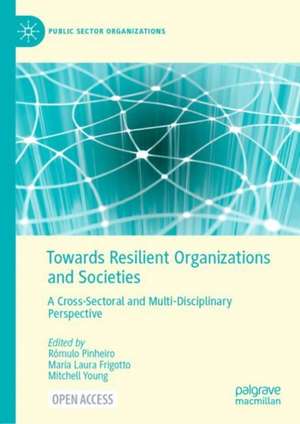Towards Resilient Organizations and Societies: A Cross-Sectoral and Multi-Disciplinary Perspective: Public Sector Organizations
Editat de Rómulo Pinheiro, Maria Laura Frigotto, Mitchell Youngen Limba Engleză Paperback – 17 noi 2021
| Toate formatele și edițiile | Preț | Express |
|---|---|---|
| Paperback (1) | 357.63 lei 6-8 săpt. | |
| Springer International Publishing – 17 noi 2021 | 357.63 lei 6-8 săpt. | |
| Hardback (1) | 430.37 lei 6-8 săpt. | |
| Springer International Publishing – 17 noi 2021 | 430.37 lei 6-8 săpt. |
Din seria Public Sector Organizations
-
 Preț: 334.51 lei
Preț: 334.51 lei -
 Preț: 394.12 lei
Preț: 394.12 lei -
 Preț: 384.86 lei
Preț: 384.86 lei -
 Preț: 389.70 lei
Preț: 389.70 lei -
 Preț: 392.60 lei
Preț: 392.60 lei - 15%
 Preț: 656.25 lei
Preț: 656.25 lei -
 Preț: 392.37 lei
Preț: 392.37 lei - 18%
 Preț: 998.66 lei
Preț: 998.66 lei - 18%
 Preț: 944.82 lei
Preț: 944.82 lei - 15%
 Preț: 644.18 lei
Preț: 644.18 lei -
 Preț: 395.09 lei
Preț: 395.09 lei - 18%
 Preț: 729.68 lei
Preț: 729.68 lei - 15%
 Preț: 502.04 lei
Preț: 502.04 lei - 15%
 Preț: 579.52 lei
Preț: 579.52 lei - 18%
 Preț: 783.35 lei
Preț: 783.35 lei -
 Preț: 392.60 lei
Preț: 392.60 lei - 15%
 Preț: 644.18 lei
Preț: 644.18 lei -
 Preț: 392.37 lei
Preț: 392.37 lei
Preț: 357.63 lei
Nou
Puncte Express: 536
Preț estimativ în valută:
68.43€ • 71.31$ • 56.66£
68.43€ • 71.31$ • 56.66£
Carte tipărită la comandă
Livrare economică 03-17 aprilie
Preluare comenzi: 021 569.72.76
Specificații
ISBN-13: 9783030820749
ISBN-10: 3030820742
Pagini: 250
Ilustrații: XXIX, 336 p. 18 illus., 10 illus. in color.
Dimensiuni: 148 x 210 x 27 mm
Greutate: 0.48 kg
Ediția:1st ed. 2022
Editura: Springer International Publishing
Colecția Palgrave Macmillan
Seria Public Sector Organizations
Locul publicării:Cham, Switzerland
ISBN-10: 3030820742
Pagini: 250
Ilustrații: XXIX, 336 p. 18 illus., 10 illus. in color.
Dimensiuni: 148 x 210 x 27 mm
Greutate: 0.48 kg
Ediția:1st ed. 2022
Editura: Springer International Publishing
Colecția Palgrave Macmillan
Seria Public Sector Organizations
Locul publicării:Cham, Switzerland
Cuprins
1. Resilience in organizations and societies: the state of the art and three organizing principles for moving forward.- 2. Decision premises, learning and organizational resilience addressing novel adversities.- 3. Installing an action space for resilience in surprising situations.- 4. Building resilience in temporary organizations: Lessons from a shipyard.- 5. A practical perspective on resilience in organizations: The interplay between structure and action.- 6. Growing and adapting during continuous change: Building employee resilience in the public sector.- 7. The Post-Entrepreneurial University: The Case for Resilience in Higher Education.- 8. Organizational persistence in highly institutionalized environments: Unpacking the relation between identity and resilience.- 9. Resilience and change in opera theaters: Traveling the edge of tradition and contemporaneity.- 10. Being resilient between the region and the higher education system? Regional higher education institutions in Kuressaare, Estonia, and Seinäjoki, Finland.- 11. Agency, institutions and regional resilience: An approach from the Basque region.- 12. Towards Resilient Organisations and Societies? Reflections on the Multifaceted Nature of Resilience.
Notă biografică
Rómulo Pinheiro is Professor of Public Policy and Administration at the Department of Political Science and Management at the University of Agder, Norway. His research interests are located at the intersection of public policy and administration, organizational theory, economic geography and higher education studies.
Maria Laura Frigotto is Associate Professor in Organization Theory and Management at the Department of Economics and Management at the University of Trento, Italy. Her research focuses on novelty, especially in its unexpected and emergent form, in relation to resilience and innovation.
Mitchell Young is Assistant Professor in the Department of European Studies, Institute of International Studies at Charles University, Czech Republic. His research focuses on knowledge governance in the EU and Member States both internally as a form of integration and externally through science diplomacy.
Mitchell Young is Assistant Professor in the Department of European Studies, Institute of International Studies at Charles University, Czech Republic. His research focuses on knowledge governance in the EU and Member States both internally as a form of integration and externally through science diplomacy.
Textul de pe ultima copertă
This open access book brings together scholars in the fields of management, public policy, regional studies, and organization theory around the concept of resilience. The aim is to provide a more holistic understanding of the complex phenomenon of resilience from a multi-sectorial, cross-national, and multidisciplinary perspective. The book facilitates a conversation across diverse disciplinary specializations and empirical domains. The authors contribute both to theory testing and theory development and provide key empirical insights useful for societies, organizations, and individuals experiencing disruptive pressures, not least in the context of a post-COVID-19 world. Diverse chapters are held together by a clear organization of the volume across levels of analysis (resilience in organizations and societies) and by an original perspective on resilience derived from an extended review, by the editors, of the existing literature and knowledge gaps, according to which each of the individual chapter contributions is positioned and connected to.
Rómulo Pinheiro is Professor of Public Policy and Administration at the Department of Political Science and Management at the University of Agder, Norway.
Maria Laura Frigotto is Associate Professor in Organization Theory and Management at the Department of Economics and Management at the University of Trento, Italy.
Mitchell Young is Assistant Professor in the Department of European Studies, Institute of International Studies at Charles University, Czech Republic.
Caracteristici
This book is open access, which means that you have free and unlimited access Brings together scholars from a multitude of fields around the concept of resilience Provides a holistic understanding of resilience from a multi-sectorial, cross-national Facilitates a conversation across diverse disciplinary specializations and empirical domains
